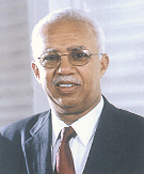-says US$1m waste water treatment plant non-negotiable
The high tax levelled on Banks beer in comparison with the rest of the Caribbean as well as the continuing problem of uncustomed smuggled beer into Guyana remain major concerns, Chairman of Banks DIH, Clifford Reis says.

“We are again recommending that legislation be passed under the Food and Drug Act whereby the name and addresses of the importer and distributor has to be printed on the label of all malt-based beverages, liquors and other products. This law, if instituted will assist law enforcement agencies to identify a product and the legal importer”, said Reis, addressing shareholders at the company’s 54th Annual General Meeting on Saturday.
He pointed out that millions of dollars in taxes and jobs are lost every year when foreign beer, liquor and other products are brought into Guyana illegally. Reis noted that high-tax commodities are attractive to smugglers and when this occurs government loses revenue and manufacturers are placed at a disadvantage. In many instances the illegal importer sells the commodity at a price lower than the price the commodity is sold for in the country of origin, he said. “A joint effort on the part of the regulatory bodies and enforcement of the existing legislation will be necessary to ensure that… tax revenues and employment are maintained”, said Reis.
Reflecting on the company’s performance last year, he stated that the economic environment proved very challenging in 2009 with the effects of the global economic crisis adversely impacting economic activities here. The economic downturn and high unemployment in the United States and other population centres restricted remittances and in turn affected the spending power of families, “which have to depend on these cash injections to make ends meet”, he noted. He said that these restrictions added to the minimum increase in economic activity in the country and a general malaise which appears to have taken hold of just about every aspect of life and living in Guyana. He warned that the company must not go with the flow stating that this is not the way things are done in Banks.
Reis said that the increase in overall profitability was due to some cost-cutting measures but there were also increased expenses which affected the profits of the company. The company’s profit after tax was $1.121b – surpassing the billion-dollar mark for the first time. There was a significant write back last year of $473m to income after the resolution of an excise tax issue from 2008 with the Guyana Revenue Authority.
Reis noted the recognition given to the company’s rum products in the United Kingdom and Europe, where several products won international recognition and awards. He noted that this year, $1.272B will be spent on several projects including a wastewater treatment plant and beer bottling plant washer. In relation to the wastewater treatment plant – a US$1M investment – he said that this is non-negotiable. Reis noted that Banks has been a bottling partner of the Coca-Cola Company for a number of years and with increasing concern about the environment, the company requires that each bottler put in place measures to ensure that activities do not compromise the environment in any way.
He said that they have committed to the installation of the plant to ensure that any discharge from the production process into the rivers and streams are environmentally acceptable and conform to the required standards. “This is a non-negotiable requirement which must be put in place by the end of 2010”, he stressed.
Meantime, Reis said that the recruitment of suitable persons for the workforce continues to be a challenging experience noting the continuing hemorrhaging of the human resource base and skills set.
While he pointed to programmes being pursued by the company to train its employees, he also posited that Guyanese, who were forced to return home from certain CARICOM countries and other areas, could replace skills lost over the years and “this may well be good for us”. This year, he said, Banks will focus on the reduction and elimination of waste in every facet of company operations.
At the AGM, Reis responded to several questions raised by shareholders including one questioning why the wastewater treatment plant was a necessary investment. “Either we do it or we stop bottling Coca-Cola”, Reis responded noting that the Coca Cola Company is contributing 50% of the cost.
He also responded that the company is going to unveil several new products this year including a new chicken-flavoured one.
He disclosed, in response to another question, that the company is pursuing the school feeding programme with government already paying 50% of the money for supplies to be provided by the company. Asked about the effect that the CLICO (Guyana) debacle had on the company, he noted that Banks was covered by several companies. In relation to the pension benefits scheme, he noted that after reviewing the operations of CLICO, Banks had written the company’s management requesting the cancellation of the policy and the refund of the pension in November 2008. “We saw this coming”, he commented. Reis said that CLICO assured that they would refund the employee scheme deposit but the day that the cheque was to be sent to Banks, CLICO announced their insolvency. Earlier, Reis had outlined the effect that the CLICO debacle had had on the company and the measures since taken.
Meantime, several longstanding employees were awarded shares in the company while donations were also made to several schools.





